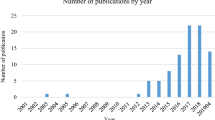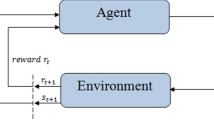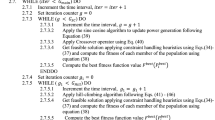Abstract
In this paper, we develop a dynamic control algorithm for production scheduling that considers machine capacity and idle time controls and aims at satisfying time related production demand and reducing energy consumption in a unified manner. A mixed integer nonlinear programming (MINLP) model is developed to determine job arrival sequence for a machine and machine capacity while minimizing resulting costs of just-in-time production, machine repair, and energy consumption during machine idle time and nominal processing. A dynamic control algorithm based on feedback control of continuous variables is also developed to determine an energy-efficient production schedule with proper machine capacity and turn-off schedules. Energy, JIT, and maintenance costs of the proposed approach are examined using real energy and machining parameters of a HAAS VF0 milling machine. Algorithmic performance of the proposed dynamic control approach is compared to other heuristics, adaptive large neighborhood search (ALNS), and genetic algorithm (GA) with a speed optimization (SO) component. Experimental results show that the proposed algorithm improved performance by an average 10.0 ~ 93.8% and 0.52 ~ 22.9% compared to GA and ALNS with the SO module, respectively.








Similar content being viewed by others
References
Albadi MH, El-Saadany EF (2008) A summary of demand response in electricity markets. Electr Power Syst Res 78(11):1989–1996
Albertelli P, Keshari A, Matta A (2016) Energy oriented multi cutting parameter optimization in face milling. J Clean Prod 137:1602–1618
Brundage MP, Chang Q, Li Y, Xiao G, Arinez J (2014) Energy efficiency management of an integrated serial production line and hvac system. IEEE transactions on automation science and engineering 11(3):789–797
Brundage MP, Chang Q, Li Y, Arinez J, Xiao G (2016) Implementing a real-time, energy-efficient control methodology to maximize manufacturing profits. IEEE transactions on systems, man, and cybernetics: systems 46(6):855–866
Che A, Zeng Y, Lyu K (2016) An efficient greedy insertion heuristic for energy-conscious single machine scheduling problem under time-of-use electricity tariffs. J Clean Prod 129:565–577
Che A, Zhang S, Wu X (2017) Energy-conscious unrelated parallel machine scheduling under time-of- use electricity tariffs. J Clean Prod 156:688–697
Chen G, Zhang L, Arinez J, Biller S (2013) Energy- efficient production systems through schedule-based operations. IEEE Trans Autom Sci Eng 10(1):27–37
Dai M, Tang D, Giret A, Salido MA, Li WD (2013) Energy-efficient scheduling for a flexible flow shop using an improved genetic-simulated annealing algorithm. Robot Comput Integr Manuf 29(5):418–429
Demir E, Bekta ST, Laporte G (2012) An adaptive large neighborhood search heuristic for the pollution-routing problem. Eur J Oper Res 223(2):346–359
Ding JY, Song S, Zhang R, Chiong R, Wu C (2016) Parallel machine scheduling under time-of-use electricity prices: new models and optimization approaches. IEEE Trans Autom Sci Eng 13(2):1138–1154
Fang K, Uhan N, Zhao F, Sutherland JW (2011) A new shop scheduling approach in support of sustainable manufacturing. In: Glocalized solutions for sustainability in manufacturing, Springer, pp 305–310
Fang K, Uhan NA, Zhao F, Sutherland JW (2016) Scheduling on a single machine under time-of-use electricity tariffs. Ann Oper Res 238(1–2):199–227
Frigerio N, Matta A (2015a) Analysis of an energy oriented switching control of production lines. Procedia CIRP 29:34–39
Frigerio N, Matta A (2015b) Energy-efficient control strategies for machine tools with stochastic arrivals. IEEE Trans Autom Sci Eng 12(1):50–61
Gahm C, Denz F, Dirr M, Tuma A (2016) Energy-efficient scheduling in manufacturing companies: a review and research framework. Eur J Oper Res 248(3):744–757
Garetti M, Taisch M (2012) Sustainable manufacturing: trends and research challenges. Production Planning & Control 23(2–3):83–104
Giret A, Trentesaux D, Prabhu V (2015) Sustainability in manufacturing operations scheduling: a state of the art review. J Manuf Syst 37:126–140
Gschwind T, Drexl M (2019) Adaptive large neighborhood search with a constant-time feasibility test for the dial-a-ride problem. Transp Sci 53(2):480–491
Gu W, Cattaruzza D, Ogier M, Semet F (2019) Adaptive large neighborhood search for the commodity constrained split delivery vrp. Comput Oper Res 112:104761
Gutowski TG, Branham MS, Dahmus JB, Jones AJ, Thiriez A, Sekulic DP (2009) Thermodynamic analysis of resources used in manufacturing processes. Environmental science & technology 43(5):1584–1590
Hosseinabadi AAR, Vahidi J, Saemi B, Sangaiah AK, Elhoseny M (2019) Extended genetic algorithm for solving open-shop scheduling problem. Soft Comput 23(13):5099–5116
Jeon HW, Lee S, Kargarian A, Kang Y (2017) Power demand risk models on milling machines. J Clean Prod 165:1215–1228
Jia Z, Zhang L, Arinez J, Xiao G (2016) Performance analysis for serial production lines with bernoulli machines and real-time wip-based machine switch- on/off control. Int J Prod Res 54(21):6285–6301
Lee S, Do Chung B, Jeon HW, Chang J (2017) A dynamic control approach for energy-efficient production scheduling on a single machine under time-varying electricity pricing. Journal of Cleaner Pro- duction 165:552–563
Liu GS, Yang HD, Cheng MB (2017) A three-stage decomposition approach for energy-aware scheduling with processing-time-dependent product quality. Int J Prod Res 55(11):3073–3091
Liu Y, Dong H, Lohse N, Petrovic S, Gindy N (2014) An investigation into minimising total energy consumption and total weighted tardiness in job shops. J Clean Prod 65:87–96
Liu Y, Dong H, Lohse N, Petrovic S (2016) A multi- objective genetic algorithm for optimisation of energy consumption and shop floor production performance. Int J Prod Econ 179:259–272
Luo H, Du B, Huang GQ, Chen H, Li X (2013) Hybrid flow shop scheduling considering machine electricity consumption cost. Int J Prod Econ 146(2):423–439
Lusby RM, Schwierz M, Range TM, Larsen J (2016) An adaptive large neighborhood search procedure applied to the dynamic patient admission scheduling problem. Artificial intelligence in medicine 74:21–31
Mashaei M, Lennartson B (2013) Energy reduction in a pallet-constrained flow shop through on–off control of idle machines. IEEE Transactions on Automation Science and Engineering 10(1):45–56
Moon JY, Park J (2014) Smart production scheduling with time-dependent and machine-dependent electricity cost by considering distributed energy resources and energy storage. Int J Prod Res 52(13):3922–3939
Moon JY, Shin K, Park J (2013) Optimization of production scheduling with time-dependent and machine-dependent electricity cost for industrial energy efficiency. Int J Adv Manuf Technol 68(1–4):523–535
Mouzon G, Yildirim MB, Twomey J (2007) Operational methods for minimization of energy consumption of manufacturing equipment. Int J Prod Res 45(18–19):4247–4271
Muller LF, Spoorendonk S, Pisinger D (2012) A hybrid adaptive large neighborhood search heuristic for lot-sizing with setup times. Eur J Oper Res 218(3):614–623
Prabhu VV (2000) Performance of real-time distributed arrival time control in heterarchical manufacturing systems. IIE Trans 32(4):323–331
Rifai AP, Nguyen HT, Dawal SZM (2016) Multi-objective adaptive large neighborhood search for distributed reentrant permutation flow shop scheduling. Appl Soft Comput 40:42–57
Ropke S, Pisinger D (2006) An adaptive large neighborhood search heuristic for the pickup and delivery problem with time windows. Transp Sci 40(4):455–472
Rubaiee S, Cinar S, Yildirim MB (2018) An energy- aware multiobjective optimization framework to minimize total tardiness and energy cost on a single-machine nonpreemptive scheduling. IEEE Trans Eng Manag 66(4):699–714
Shrouf F, Ordieres-Mer’e J, Garc’ıa-S’anchez A, Ortega-Mier M (2014) Optimizing the production scheduling of a single machine to minimize total energy consumption costs. J Clean Prod 67:197–207
Su H, Frigerio N, Matta A (2016) Energy saving opportunities and value of information: a trade-off in a production line. Procedia CIRP 48:301–306
Wang J, Li J, Huang N (2011) Optimal vehicle batching and sequencing to reduce energy consumption and atmospheric emissions in automotive paint shops. International Journal of Sustainable Manufacturing 2(2–3):141–160
Wang S, Wang X, Yu J, Ma S, Liu M (2018) Bi-objective identical parallel machine scheduling to minimize total energy consumption and makespan. J Clean Prod 193:424–440
Zames G, Ajlouni N, Ajlouni N, Ajlouni N, Holland J, Hills W, Goldberg D (1981) Genetic algorithms in search, optimization and machine learning. Inf Technol J 3(1):301–302
Author information
Authors and Affiliations
Corresponding author
Additional information
Publisher’s note
Springer Nature remains neutral with regard to jurisdictional claims in published maps and institutional affiliations.
Rights and permissions
About this article
Cite this article
Lee, S., Issabakhsh, M., Jeon, H.W. et al. Idle time and capacity control for a single machine scheduling problem with dynamic electricity pricing. Oper Manag Res 13, 197–217 (2020). https://doi.org/10.1007/s12063-020-00156-x
Received:
Revised:
Accepted:
Published:
Issue Date:
DOI: https://doi.org/10.1007/s12063-020-00156-x




